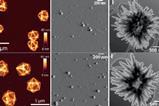A now-deleted essay in Wiley’s Angewandte Chemie arguing that diversity actually harms organic synthesis research has sparked indignation and outrage among chemists. Sixteen of the journal’s 44 international advisory board members have now resigned and the community has been left questioning how the manuscript was peer reviewed and then published in one of the highest profile chemistry journals.
‘When I think about the efforts to which underrepresented groups and young people go to try to get a publication in Angewandte and then something of this incredibly low quality is reviewed and accepted – this is the definition of privilege,’ says Cathleen Crudden from Queen’s University in Canada, and the first board member to resign.
This kind of behaviour has been tolerated far too long
Cathleen Crudden, Queen’s University
Brock University chemist Tomáš Hudlický’s piece was published on Thursday 4 June, as a reflection on Dieter Seebach’s 1990 review Organic synthesis – Where now?. Hudlický looks at eight factors that influence chemistry using a figure reproduced from his 2007 book The Way of Synthesis, published by Wiley. It purports to show that certain factors – such as information technology – can be either positive or negative, while others – like diversity – only exert a negative influence on the field.
Hudlický laments that diversity training has ‘influenced hiring practices to the point where the candidate’s inclusion in one of the preferred social groups may override his or her qualifications’. He also claims that efforts to increase women’s participation in science – like Gordon Research Conferences’ power hour – ‘diminishes the contributions by men’. Hudlický also asserts that skills transfer can only occur successfully if there is ‘an unconditional submission of the apprentice to his/her master’.
This caught the attention of University of Nottingham, UK, chemist Matt Cliffe, who on Friday tweeted at Angewandte Chemie: ‘I’m sorry, your RSS feed appears to be broken again. This anti-diversity screed appears to be from thirty years ago.’
I'm sorry, @angew_chem your RSS feed appears to be broken again. This antidiversity screed appears to be from thirty years ago. https://t.co/srf3wXXWVq pic.twitter.com/Vp6q2z3nvX
— Matt Cliffe (@MJCliffe) June 5, 2020
Hundreds of chemists replied to Cliffe’s post, expressing outrage over the scientifically unfounded and morally questionable claims. Richmond Sarpong’s team at the University of California, Berkeley, US, called the essay ‘abhorrent’, while Donna Blackmond and Phil Baran at Scripps in the US said it was ‘egregious’. ‘The sections in question are pure opinion uncontaminated by expertise,’ Andrew Bissette, senior editor at Nature journal Communications Chemistry, pointed out.
The Chinese Chemical Society responded to a section on literature integrity, calling it slander. Hudlický alleged that publishing pressures on Chinese academics mean it is ‘not surprising that fraud and improper publication protocols are common’.
Hudlický declined to comment.
Outdated attitudes
Most chemists were unsurprised by the sentiments expressed in the essay. ‘It is very important that our community understands how toxic attitudes have shaped (and now we see continue to shape) the demographics of our field,’ wrote Carolyn Bertozzi from Stanford University, US.
Some in our community still hold attitudes that are outdated, offensive and discriminatory
Alliance of six chemical societies
‘We spend an awful lot of time talking about unconscious bias in the academic world, but it makes us forget that there is perfectly conscious bias going on as well, which this is a very clear example of,’ agrees Tom Welton from Imperial College London, UK.
‘Some in our community still hold attitudes that are outdated, offensive and discriminatory,’ said a statement signed by six chemical societies, including the Royal Society of Chemistry and the German Chemical Society. ‘We will not stand for this. Diversity and equality are fantastic strengths in workplaces, in culture and in wider society. This is not only demonstrated by overwhelming evidence from decades of research, but we also hold it is morally the only acceptable position.’
What shocked the community most was the essay’s publication in a prestigious journal. Welton questions what the reviewers were asked to do and how they were selected in the first place. ‘You would have to positively avoid reviewers who would not look at that article and say: “There’s a problem with this”,’ he says.
‘Failed the community’
The journal promptly deleted the manuscript on Friday afternoon, stating that ‘it wasn’t the final version and is pending further editing and final review. Something went very wrong here and we’re committed to do[ing] better’. The essay was marked as ‘accepted article’, meaning it was awaiting editing, proofing and formal publication, but had been accepted after peer review.
We are deeply sorry and know we have failed the community that puts their trust in us
Neville Compton, Angewandte Chemie
‘We are deeply sorry and know we have failed the community that puts their trust in us,’ said Neville Compton, Angewandte Chemie’s editor-in-chief, in a statement later on Friday. In a joint statement released on Monday, Annette Beck-Sickinger, chair of Angewandte Chemie’s editorial board, and German Chemical Society president Peter Schreiner confirmed that two editors had been suspended and the essay’s two international referees removed from the journal’s reviewer pool. ‘A full investigation of the case has been initiated,’ they wrote.
Many of the journal’s international advisory board members felt further action needed to be taken. ‘After I read through the article, I just didn’t think there was any way I could remain on the board,’ says Crudden. She was the first to resign on Friday afternoon. ‘I have had other issues brought to my attention in the Canadian context of bias in publishing at Angewandte,’ Crudden adds. ‘When I got involved in the discussion, nothing really happened. I didn’t feel that the issue of bias was taken seriously.’
On Monday, 15 other board members – a third of the entire board, including three Nobel laureates – followed suit. ‘We believe the disturbing act of Angewandte Chemie accepting and publishing an essay that promotes racist and sexist views points to a larger problem wherein systems in the journal’s publishing practices have suppressed ethnic and gender diversity,’ they wrote in a joint statement.
I know the Hudlicky essay recently published in @angew_chem hurt many. I am resigning from their International Advisory Board effective immediately. Please see the full statement below from me and my colleagues across the chemical sciences. pic.twitter.com/5irAcWGmhx
— Joseph DeSimone (@Joseph_DeSimone) June 8, 2020
Whether the essay’s publication will have any consequences for Hudlický professional standing remains to be seen. ‘Do I wish we lived in a world where actually his employer would at least look and take action? I do,’ says Welton. ‘But I don’t think we yet live in that world.’ In a statement, Brock University distanced itself from Hudlický’s views, but didn’t state that any action would be taken.
‘The time for boilerplate statements is done,’ says Crudden. ‘We need to tell the community what is going to happen. This kind of behaviour has been tolerated far too long.’
Correction: The publication date of the essay was updated 10 June 2020

















5 readers' comments